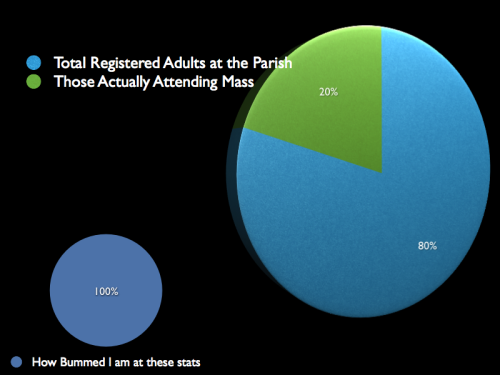Too Big Not to Fail...
We have approximately 22,000 parishioners, 10,000 of which are adults. Do all of these adults attend our parish every week? No way. Only about 6,400 individuals (children and adults) attend each weekend. If our parish coincides with the national averages, that means about 2,540 are adults, and 3,860 are kids. So that means out of our 10,000 adults only 2,540 get to Mass, and of that number a substantial portion are monthly Mass goers.
And our parish is getting bigger. Right now we are at 5,300 families and are expected to climb between 7,000 to 10,000 families in the next 15 years, due to the influx of Exxon employees to their new super complex just south of The Woodlands.

We have three priests. Our pastor is a diocesan priest and is supported by two associates from a religious order. We have 4 very active deacons as well. Our staff is probably 30 people, not counting the school, that are part or full time.
This means that for 22,000 parishioners we have 7 clergymen and 30 staff. That's just a mere 595 congregants per staffer! For now. In five years it will look more like 811 congregants per staffer.
In conclusion, we have enough clergy for funeral masses, but not enough for care ministry. We have enough room for weddings, but are running to keep up with marriage preparation. We have built a huge educational ediface for adults, but only 800 can attend throughout the week maximum. Where are the 9,200 going to go? How are they being served? And since only a fraction of those registered actually come to Mass, how could we possibly help them to get engaged, committed, and connected to the life of the parish?
I think the answer is Small Groups. Small groups, for those communities that do it right, are based around the idea that getting people together in small enough numbers where no one can be anonymous, where names are known and absenses felt, actually make big Church better.
People who are active in small groups find that they are connected to the local church more because they are experiencing formation in, with, and by the local church without having to be physically in the building. By creating a custom-tailored small group ministry to our educational and spiritual needs, we have the ability to form 100% of the people that are registered because it will be done across hundreds of homes, instead of fighting for the three big classrooms every week on campus.
Creating small groups needs to be intentional. That means there is a goal, a process, and content. The goal is to get individuals to experience the Body of Christ, and thus have a relationship with Jesus Christ and His Church. The process is the small group meeting- Hosts who are trained and ready, a limited size, a limited timeframe, ongoing evaluation between Host and staff- this is crucial to maintaining a purposeful, intentional small group process. And finally, the content needs to be kerygmatic, not necessarily didactic. The kerygma is the basic Gospel message- the person of Jesus Christ presented in a powerful, faith-building way.
Too many small groups start with a book and a few committed people and that's it. There is no ongoing service of the groups on behalf of the parish, let alone oversight and support. There's often no goal, so it degrades into mere self-help groups, or socializing with a Christian pretext. And the content can be loosey-goosey, non-systematic, and not so engaging.
People who have Christ-centered community end up having a greater commitment to their parish because they know they belong there. People who have no such community will walk away. Our mission is create opportunities, structured and intentional, for people to build up those communities. My belief is that all of these things should be done away from the parish campus. People need to think about Church as something other than a building you go to once a week (or once in a while). God has called us out of the world and assembled us into His adopted family. That is Church. It is being, not building. It is movement. It is alive.
When we care for people hurting, minister to their needs, create accessible educational opportunities, get people praying together, talking together and doing life together, then we have started building an authentic Christian community. Small groups, set up and run by the parish, but implemented by a hundred or a thousand "Hosts" out there in parishioners' homes, can build up the local parish and the domestic church. A small group can cook two weeks' worth of meals for a hurting widow, can intercede for one another, and can build each other up.
A mega-parish is limited by its size. People feel anonymous. Small groups are our attempt to recreate smallness to recreate community.